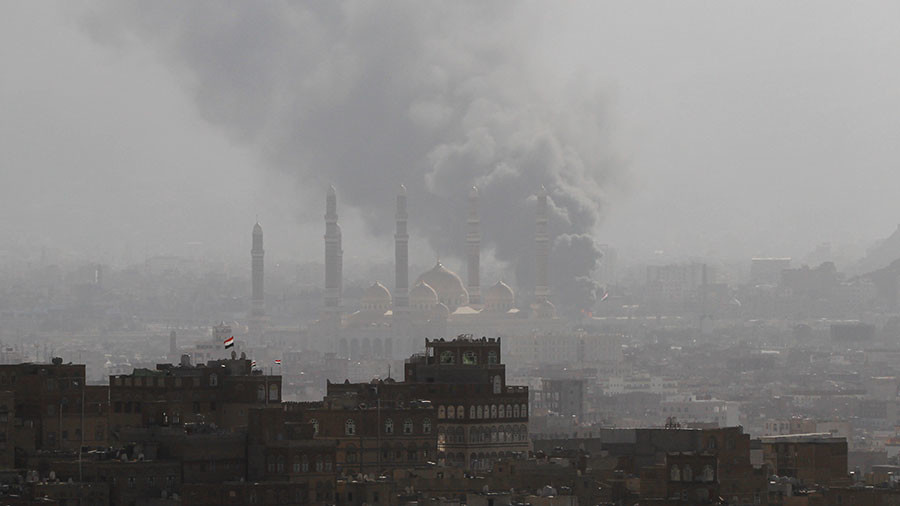2
December, 2017
The
alliance between the Houthi rebels and former Yemeni President Ali
Abdullah Saleh seems to be on the verge of a split. Together these
groups have been fighting against the Saudi-backed forces of ousted
President Abdrabbuh Mansur Hadi since 2015.
Saleh
on Saturday said he was ready to turn a “new page” in relations
with the Saudi-led coalition, which had intervened to place his
successor back in power. He said his offer would require Riyadh to
stop attacks on Yemen. “I call upon the brothers in neighboring
states and the alliance to stop their aggression, lift the siege,
open the airports and allow food aid and the saving of the wounded
and we will turn a new page by virtue of our neighborliness,” Saleh
said in a televised speech.
The
address came as forces loyal to Saleh were engaged in battle with the
troops of Ansar Allah, or the Houthi rebels, in the capital Sanaa.
Hostilities between the two sides broke out on Wednesday.
More
than 100 people were killed in clashes between Houthis and forces
loyal to ex-President Saleh on Saturday, Sky News Arabia reported,
citing military and medical sources. The majority of those killed
were Houthi fighters, the Abu Dhabi-based broadcaster added.
Yemen’s
former President Ali Abdullah Saleh © Khaled Abdullah / Reuters
Saleh
was forced to surrender his office in 2012 amid a wave of mass
protests in the country, abandoning the presidency to his
Vice-President Hadi. Hadi ran uncontested, won a landslide victory
and was expected to resign two years later, but failed to do so amid
increasing pressure from the Houthi rebels. In 2015 he fled to Saudi
Arabia, which used its military force in a bid to place him back in
power in Yemen. The coalition is supported by some Western nations,
including the US and the UK, which provide intelligence, refueling
and weapons for the war effort. The Houthi allied themselves with the
forces loyal to Saleh and have fought a devastating war against
forces loyal to Hadi and his foreign backers.
Saleh’s
statements were welcomed by the Saudi coalition, which said it was
“confident of the will of the leaders and sons” of Saleh’s
General People’s Congress (GPC) party to return to the Arab fold.
The former president’s alliance with the Shiite rebels, who are
presumed in Riyadh to be a proxy force of Iran, was perceived in the
Arab kingdom as a betrayal of Sunni Islam.
The
Houthi rebels denounced what they described as “sedition,”
meaning Saleh’s behaviour towards the Saudi coalition. “Saleh’s
speech is a coup against our alliance and partnership… and exposed
the deception of those who claim to stand against aggression,” a
spokesman for the group said in a statement carried by the rebels’
Al Masirah TV. Abdel-Malek al-Houthi, the leader of the rebels,
called on Saleh to “show more wisdom and maturity” in a separate
statement.
Saleh
may be a noticeable player in the Yemeni conflict, but one should not
overestimate the role he plays, Sergey Balmasov, senior analyst at
the Centre for Crisis Society Studies, told RT. His support has
dwindled over the past two years, so his potential decision to break
up with the Houthis would not result in a quick end to the war. “The
escalation of violence is overarching there. There is a patchwork of
forces, including Al-Qaeda in the Arab Peninsula, Hezbollah, whatever
ragtag troops Saudi Arabia brought in like Senegal units. There is in
fact no Yemen as a country: It has been torn apart.”
He
added that some speculators claim that Saleh’s statements are
actually a proposition by Saudi Arabia to roll down the hostilities
in a manner which would save face. “Riyadh is facing serious
financial difficulties. The reserves they accumulated during the fat
years are melting like a snowball in the sun,” he explained.
The
war in Yemen, the poorest country of the Arab world, is one of the
biggest humanitarian disasters of our times. It has claimed over
10,000 lives, left millions with scant access to food, fresh water
and medicine and caused the largest outbreak of cholera in modern
history. The civilian suffering was exacerbated by the Saudi naval
and air blockade of Yemen, human rights groups say. The coalition has
also been accused of committing war crimes through indiscriminate
attacks on residential areas in cities controlled by the rebel
forces.




No comments:
Post a Comment
Note: only a member of this blog may post a comment.